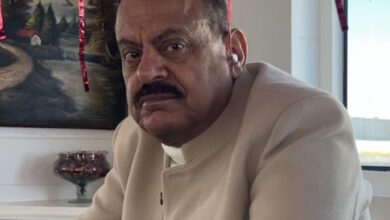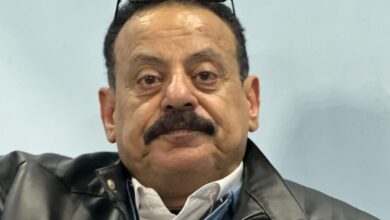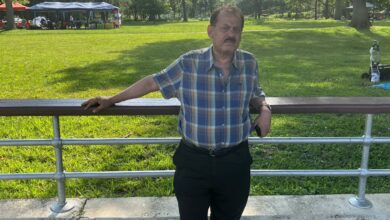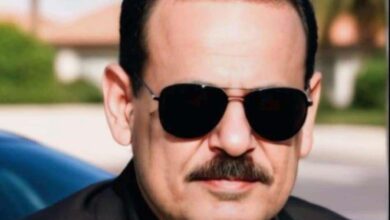The Search for a Place to Sleep
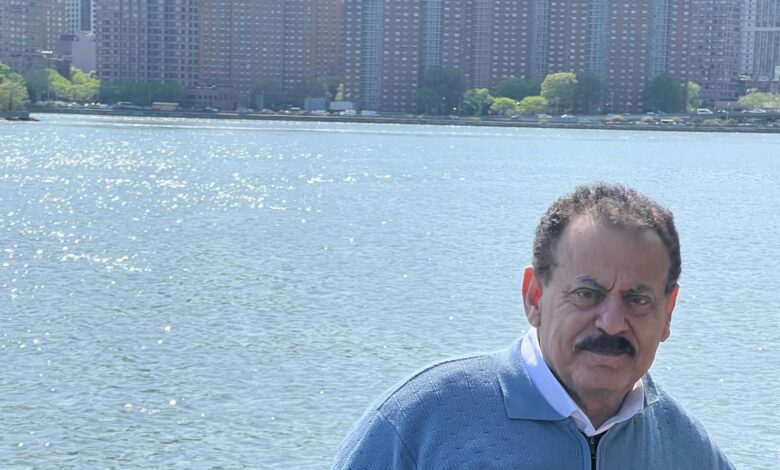
Yemeni mp
Ahmed Saif Hadhed
I leaped from the house and fled to a nearby haven, slipping into a small graveyard nestled on the slopes of the mountain in “Ijt Al-Jafif.” A profound sense of desolation, anxiety, and fear enveloped me. It was impossible to sleep here, with dawn still far off—a place filled with uncertainty, perhaps hiding surprises that lurked in wait.
I trembled at the thought of the dead rising from their graves. I knew none of them, and they would not recognize me if I approached their resting places. There was an alienation between us, a barrier that prevented any closeness or understanding. Moreover, I wished to avoid hearing the torments of the deceased as they suffered. I could not endure the sound of the punishing angels questioning the dead, rendering them speechless, followed by the overwhelming agony.
I envisioned the terrifying figures of Munkar and Nakir, monstrous and dreadful beyond imagination—heart-wrenching even for those with hearts of iron. Fear erupted within me, shaking my very core. My imagination twisted at the thought of such horrific beings. My chest tightened with paralyzing terror. The horrifying images I conjured were akin to heavy nightmares that brought me to the brink of despair, gasping at the thought of eternal separation. Such imagery resembled our current age, if not a thousand times heavier and more grotesque than the dread of Munkar and Nakir, accompanied by Azrael, the angel of death.
I pictured them with disheveled hair and unsettling dustiness, their faces grim and swollen with anger and cruelty, threatening to unleash malevolence and flames that consume both green and dry. Their faces bore deep, fearsome lines, eager to pounce upon us. They seemed to revel in a suffering they could not endure without.
Their eyebrows were thick like brooms, and their tangled mustaches resembled goblins; their ears sprouted like gnarled wood, and their cheeks sagged like gallows. They had beards as dense as a withering forest, imposing and colossal in form—flesh and fat amassed in their limbs and shoulders. They exhibited neither sensation nor emotion, devoid of mercy or compassion, cold-hearted and sadistic in their suffering. They delighted in pain, in the sound of moans and wails, questioning the deceased in their graves and whipping them with fiery lashes, crimson and blazing.
I anticipated their descent from the heavens after midnight, ready to administer judgment and punishment. As terrified as I was of them, the thought of witnessing a man or woman forced to pray upon a rock from hell was even more chilling. I could not bear to see them in any form, nor could I tolerate the cries of the dead in pain.
I had heard many tales about the lives of the dead in their graves, and I believed them, for I had not encountered anyone who had denied or questioned their truth. Thus, we engage with most certainties, accepting what is recounted and transmitted without scrutiny, doubt, or inquiry.
* * *
A powerful urge overcame me to leave this frightening place. I felt an urgent need to depart without delay. It was essential that I find a location less dreadful than where I currently stood, a place more secure from the wild beasts and lurking dangers of the night.
I knew I must not stray too far from the homes of others. Should I encounter a predator, I wanted to be close enough to find someone who could help me or to rush to a nearby house in search of refuge. I had heard many tales of men who had been devoured by these predators, leaving nothing behind but remnants of bones and limbs by morning. Such thoughts filled my mind, intensifying my fear and overwhelming me with dread.
I took refuge near the home of a kind man named Thabit Saleh, who was burdened by poverty. His sunken face bore a hint of darkness, and though his head and face were small, they radiated kindness, compassion, and tranquility. He worked tirelessly for a meager wage, plowing the fields for others during the rainy seasons, despite having no land of his own. He carried heavy stones to build homes for others while his own house remained modest and sorrowful. Yet his heart was larger than a king’s palace, and his morals were nobler than those of any nobleman.
Thabit Saleh heard my footsteps on the mountain; in our countryside, the night listens. He heard the stones and pebbles falling as I climbed the rocky terrain. Realizing something was amiss, he shone his flashlight toward the sound and called out, “Who’s there?” He repeated his call twice, then thrice, growing increasingly certain that something warranted his attention.
He struck me as brave; he did not simply call out but climbed to where I was to investigate further. Perhaps he had heard my cries when my father struck my head against the ground, and he might have thought I was a child fleeing from a harsh father in the dark of night. The beam of his flashlight illuminated my features, making him want to confirm what he had discovered. I cannot say for certain, but he found me and recognized me, urging me to come down and spend the night with his family. I descended with him, and his wife welcomed me warmly; she was a friend of my mother’s and could hardly believe that her husband had encountered me in the mountains at such an hour.
* * *
His wife greeted me with the affection of a loving mother. Her warm, melodious voice wrapped around me, filling me with a sense of familiarity, friendship, and safety. She treated me with kindness, making me feel as though I had a second mother and a gentle father in her husband. She asked what had happened and why there had been such a commotion in our house.
I recounted the events, and tears welled in her eyes, streaming down her prominent cheeks like gentle streams. The flickering lamp light between us revealed her silent tears. I felt a powerful emotion in their presence, a great love that I longed for. How beautiful you kind, simple souls are! Your hearts are pure and filled with love, showering me with tenderness, beauty, and generosity.
The next morning, Thabit Saleh’s wife discreetly conveyed the news to my sick mother about what had transpired between my father and me, reassuring her with certainty. After two days, I returned to our home following negotiations regarding my safety that concluded favorably.
When I returned, I found my father complaining to my brother Ali, who had been away when I accidentally fired the rifle in our house. I heard my father say, “Look at what your brother has done!” He showed him the bullet holes in the walls of the house and the damage that had been done. From that day on, my brother took me to live with him in the same village, at my Aunt Um Ali’s house, my father’s second wife, who enveloped me in her overwhelming affection and kindness.
* * *


